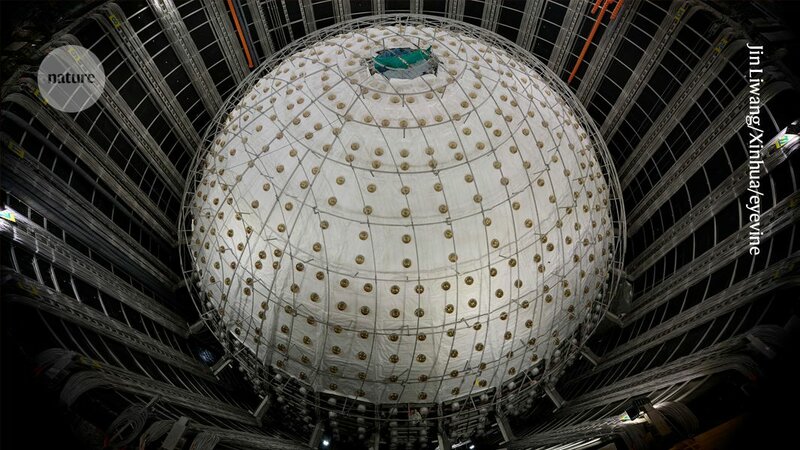Posted on Nov 4, 2024
See a giant ‘ghost particle’detector and more — October’s best science images
517
21
10
10
10
0
Posted 18 d ago
Responses: 3
They are all great pictures, but I'm partial to the manatees. The fish 'chasing" the bird is damn great timing.
(2)
(0)
It's impressive to see global advancements in neutrino research, like the Jiangmen Underground Neutrino Observatory (JUNO) in China. However, let's not forget that the United States has been a leader in this field for decades.
The U.S. is actively contributing to the understanding of neutrinos through projects like the Deep Underground Neutrino Experiment (DUNE) at the Sanford Underground Research Facility in South Dakota. DUNE will provide invaluable data on neutrino oscillations, potentially unlocking mysteries about the fundamental particles of our universe. This facility could offer insights not just into neutrinos but also into the origins of matter itself, positioning the U.S. at the forefront of this scientific frontier.
While JUNO aims to capture neutrinos from nuclear reactors and space, America's projects are also designed to tackle some of the biggest questions in particle physics, including why there's more matter than antimatter in the universe, which neutrinos might help us understand due to their role in early universe processes.
The U.S. commitment to science and innovation in particle physics is as robust as ever, with collaborations involving scientists from around the world, ensuring that while we celebrate global scientific achievements, the U.S. remains a beacon of research and discovery in neutrino studies. The race to understand these 'ghost particles' is indeed global, but America's contributions are pivotal, continuing to drive forward our collective knowledge with cutting-edge technology and world-class research institutions.
The U.S. is actively contributing to the understanding of neutrinos through projects like the Deep Underground Neutrino Experiment (DUNE) at the Sanford Underground Research Facility in South Dakota. DUNE will provide invaluable data on neutrino oscillations, potentially unlocking mysteries about the fundamental particles of our universe. This facility could offer insights not just into neutrinos but also into the origins of matter itself, positioning the U.S. at the forefront of this scientific frontier.
While JUNO aims to capture neutrinos from nuclear reactors and space, America's projects are also designed to tackle some of the biggest questions in particle physics, including why there's more matter than antimatter in the universe, which neutrinos might help us understand due to their role in early universe processes.
The U.S. commitment to science and innovation in particle physics is as robust as ever, with collaborations involving scientists from around the world, ensuring that while we celebrate global scientific achievements, the U.S. remains a beacon of research and discovery in neutrino studies. The race to understand these 'ghost particles' is indeed global, but America's contributions are pivotal, continuing to drive forward our collective knowledge with cutting-edge technology and world-class research institutions.
(2)
(0)
Bethina Lee
SGT James Murphy LOL, that was last deep dive into theoretical physics..
A physicist had voiced/published a different opinion in the 10/12? It was sent waves of disturbance through the scientific communities.
Perhaps this gentleman? I'm not sure of the exact year..
https://www.europhysicsnews.org/articles/epn/pdf/2004/04/epn04404.pdf
https://www.jstor.org/stable/10.1086/605794
I'm not 100% sure of the physicist's name or year...his pitch was that after "The Big Bang" that the planets, black holes, stars, etc all flew from the initial "Bang" at distances equal to their weight/mass or gradational pull.
A physicist had voiced/published a different opinion in the 10/12? It was sent waves of disturbance through the scientific communities.
Perhaps this gentleman? I'm not sure of the exact year..
https://www.europhysicsnews.org/articles/epn/pdf/2004/04/epn04404.pdf
https://www.jstor.org/stable/10.1086/605794
I'm not 100% sure of the physicist's name or year...his pitch was that after "The Big Bang" that the planets, black holes, stars, etc all flew from the initial "Bang" at distances equal to their weight/mass or gradational pull.
(0)
(0)
SGT James Murphy
Bethina Lee - I actually had a discussion about String Theory with Andre's Peekna before he passed away in 2014, (I know his son Markus as well. He's trained at our facility.) He thought String Theory was bull shit. He was one of the co-inventors of the cyclotron at Firmi Labs in Chicago. But he was buddies also with Nick Bostrom. So there's that.
(1)
(0)
Bethina Lee
SGT James Murphy awesome! I love eclectic and stimulating mindsets those individuals. Their sense of humor and antics are bizarre & extremely thought provoking.
(0)
(0)
Read This Next



 Science
Science Photography
Photography Space
Space Animals
Animals


